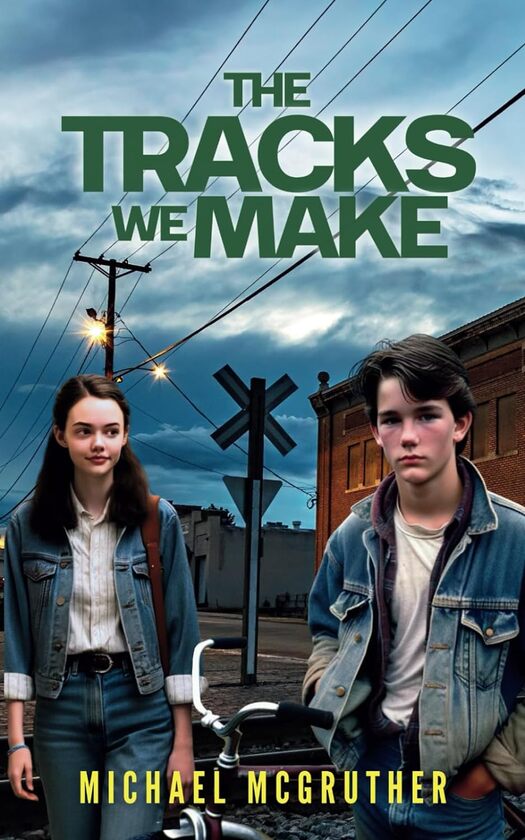Here we are at the end of the year. It’s a time, whether we like it or not, that demands reflection. Hopefully, we also feel motivated to make a better future, whether through lifestyle changes or contributing something wholesome to the world and culture.
If getting older has taught me anything it’s that even the worst chapters of my life will eventually take on a nostalgic warmth. There’s no anxiety in revisiting the past. We already know what’s going to happen, and there’s a certain degree of comfort mixed in with the pain. If getting older has taught me another thing, it’s that the deep, heart-rending pain of loss never goes away. These are the wounds that change us so that we have no choice but to adapt, like shrapnel in a soldier’s leg changes the way he walks.
But the wise develop strength in other areas.
The Tracks We Make is the latest novel from Michael McGruther, a coming of age story that doesn’t shy away from life’s harshest realities. Set in the early 90s, it first color corrects the rosy tint many of us give the decade, painting it in the hues of blue collar jobs, gray prison walls, and rust belt brown. Pete McCloskey is a pariah in Snydersville, a good kid in a bad a place. His dad is in prison for manslaughter, his brother is among the town drunk, and his mom is God only knows where.
All of his friends and neighbors are trapped there, locked in tight like lugnuts on a forgotten wheel.
But it’s the end of senior year, and all that stands between Pete and a better life is a high school diploma and soul-sucking vortex surrounding him. There’s no indication that he’ll succeed. This is Pete’s story and even though we’re experiencing it through his memories, for us every old pain and indignity is fresh. What friends he has are in the same spot, all his father can give him is advice (some good, some questionable) from behind a barrier, and Pete resigns himself to living out his life in Snydersville.
Maybe it’s better to stay in the Hell you know.
Things start to change when the prettiest girl in school, Morgan, waves at Pete as he’s riding his bike. He literally falls at her feet, leaving a gash on his knee and a bruise on his ego. It turns out to be serendipity, as Morgan patches him up and takes him home, sharing parts of her story with him on the short drive. The compassion of an intelligent and beautiful young woman with dreams inspires Pete to break the cycle (not his bicycle—he can fix that). As he explores his new worldview, Pete makes some mistakes, breaks some rules, and does some really shady stuff. But that’s what happens when you stop playing it safe.
The main thing is, Pete recenters and learns.
Too many writers working in this genre allow the main character’s arc to complete before the story is finished, but McGruther keeps challenging Pete until the final page. New problems arise before the old ones resolve and Pete spends no time treading water. Morgan is a lifeline, but no one can save Pete but himself and despair is a deadly anchor. In nearly every chapter Pete is given new reasons to fall back into resignation because that’s also a part of life.
Sometimes those reasons are tragic, and sometimes they look like blessings.
Ultimately, The Tracks We Make is a story of learning forced perspective. Train tracks in reality seem to go on forever, and in art they reach a point. An artist in the real world learns to see things both ways. Life is a journey and when we’re young (especially in the bad times) it appears to go on forever. We don’t know what stops or bumps we’ll hit along the way. An artist adjusts what he sees right now, analyzing and capturing it in a meaningful way. For him, that section of tracks comes together.
By adjusting how we look at things we can identify the purpose, the point, the apex of the moment and our calling.
Happy New Year!

























